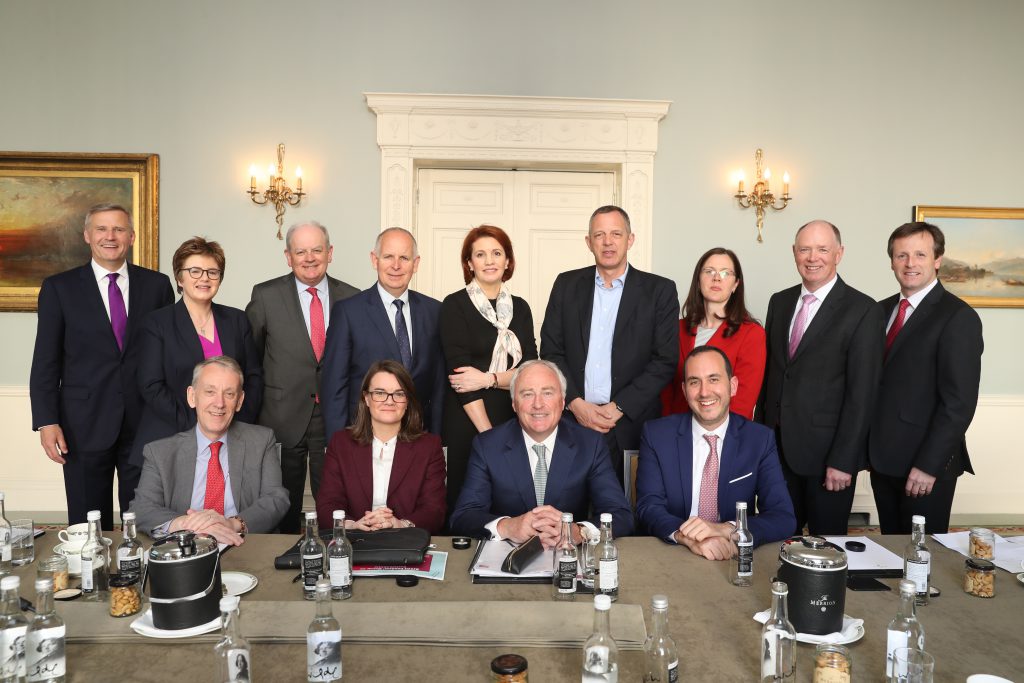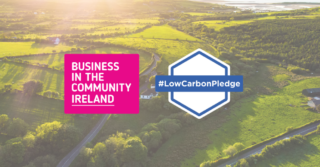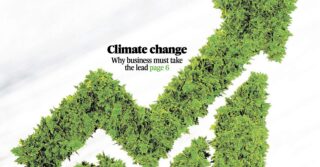Leading companies come together to address key sustainability challenges for Ireland
Business in the Community Ireland launches Leaders’ Group on Sustainability and CEOs sign up to Low Carbon Pledge to reduce carbon emissions intensity by 50% by 2030. CEOs of Ireland’s top companies have today launched The Leaders’ Group on Sustainability, a business coalition dedicated to addressing the most pressing sustainability priorities as well as future opportunities for Ireland.
Business in the Community Ireland (BITCI), the national network for sustainability, has convened 26 leading companies, representing a workforce of over 90,000 people in Ireland, to work collaboratively to address social, environmental and economic priorities. One of the first actions announced by the Group is the Low Carbon Pledge – the first dedicated public commitment generated by Irish business to lead on the transition to a low carbon economy and reduce scope 1 and 2 carbon emissions intensity by 50% by 2030*.
The CEOs are calling on business leaders to make sustainability a central priority of their leadership and promote a low carbon vision across their operations, products and services to help Ireland achieve its international commitments under the Paris Climate Agreement.
The companies involved with the Leaders’ Group on Sustainability have all achieved BITCI’s Business Working Responsibly Mark, the NSAI audited standard for CSR and sustainability.
Tomás Sercovich, CEO of Business in the Community Ireland, said, “The global Business and Sustainable Development Commission has identified US$12 trillion in economic opportunity for the low carbon and inclusive economy and this needs to be embraced by Irish businesses. We must adopt a long-term view of our business models to achieve this. We are delighted to convene this unique platform for change in corporate Ireland where we will seek to influence the business community and policy”.
In addition to addressing the transformation to a low carbon economy, The Leaders’ Group on Sustainability is also working together to remove barriers to social inclusion in Ireland by examining how Irish businesses can improve their processes and cultures to train, attract and retain marginalised and vulnerable people. The Group has also identified the need for businesses to adapt to emerging work practices that will transform Irish industry like the gig economy, contract work and automation to ensure those changes benefit employee, employer and society as a whole.
Aidan Skelly, Interim CEO, EirGrid and lead for the Low Carbon sub-group said, “The Low Carbon Pledge is an important step for the group. As business leaders, we must rise to the climate challenge and be accountable for our actions. We believe we will have a greater impact on sustainability through sharing best practice, pooling resources and exchanging data. Business has a role to play in supporting not only our own ambitions to reduce our carbon emissions, but also those in the communities that we operate in and throughout our supply chain”.
Sinead Patton, Chief Finance and Commercial Officer at Veolia and lead for the Social Cohesion sub-group, said, “We will seek to make employability equal for all, helping individuals affected by social inequality, and providing the leadership required to encourage other companies to follow suit. Our approach reflects a belief that a good working society is beneficial both for social cohesion and for business.”
Alastair Blair, Country Managing Director at Accenture in Ireland and lead for the Worker of the Future sub-group, said, “The nature of work is changing and there is a growing emphasis on more flexible and agile work practices, as well as collaboration between humans and machines. We will examine ways of ensuring the workforce in a new economy will have balanced benefits for business, society and the individual.”
The Leaders’ Group on Sustainability meets regularly to discuss best practice and to review progress on its stated aims. UCD is the knowledge partner for the Group and will provide ongoing research support to help develop and refine the sustainability goals.
ENDS
Editor’s notes:
About the Leaders’ Group on Sustainability
The Leaders’ Group on Sustainability is represented by CEOs of Ireland’s top companies, from sectors including energy, telecoms, tech, finance, transport, professional services, pharma, agriculture, retail and food that have achieved the Business Working Responsibly Mark, the NSAI audited standard for CSR and sustainability. The Mark was created by Business in the Community Ireland, the network for sustainable and responsible business in Ireland. Members include Accenture, A&L Goodbody, Arup, Bank of Ireland, Boots, CRH, Dawn Meats, Deloitte, eir, EirGrid, ESB, Fujitsu, Gas Networks Ireland, Janssen, KBC Bank, M&S, Musgrave Group, Northern Trust, PM Group, PwC, SSE Ireland, Sodexo, Transdev, Ulster Bank, Veolia and Vodafone.
Key work priorities of the Group:
Launching the Low Carbon Pledge – the first dedicated pledge generated by Irish business to set industry standards on sustainability and reduce carbon usage. The Pledge is to reduce Scope 1 & 2 carbon emissions intensity by 50% by 2030. *This refers to emissions directly from sources that are controlled by the companies, for example from vehicles owned by the companies, as well as all emissions generated from purchased electricity The Group will also share data on how to best manage their energy usage. The companies signed up to the Pledge so far are: A&L Goodbody, Arup, Bank of Ireland, Dawn Meats, Deloitte, EirGrid, ESB, Fujitsu, Gas Networks Ireland, Janssen, KBC Bank, M&S, Musgrave Group, PM Group, PwC, Ricoh, Sodexo, SSE Ireland, Ulster Bank, Veolia and Vodafone. Full details of the pledge can be downloaded from www.bitc.ie
Removing barriers to social inclusion by examining how Irish businesses can improve their processes and cultures to train, attract and retain marginalised and vulnerable people. The Group is examining how businesses can improve their operations and cultures to attract and retain people from vulnerable groups e.g. socio-economic disadvantaged groups; those not in education, employment, or training; and people with disabilities.
Adapting to emerging work practices that will transform Irish industry like the gig economy, contract work and automation to ensure those changes benefit both employee and employer. The Group recognises that they have a responsibility to ensure workers of the future are not negatively impacted by the evolving nature of the economy where there is a growing emphasis on more flexible work practices.
Contact Moira Horgan, Head of Marketing on 086 172 2105 or mhorgan@bitc.ie
Tags:







